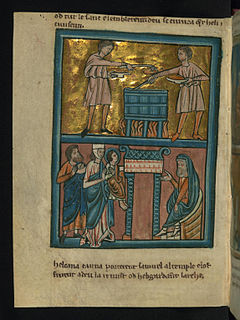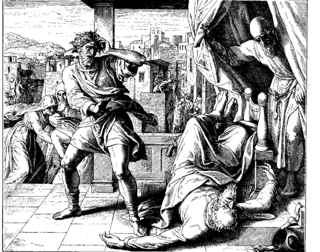 W
WEli was, according to the Books of Samuel, a High Priest of Shiloh. When Hannah came to Shiloh to pray for a son, Eli initially accused her of drunkenness, but when she protested her innocence, Eli wished her well. Hannah's eventual child, Samuel, was raised by Eli in the tabernacle. When Eli failed to rein in the abusive behavior of his sons, Yahweh promised to punish his family, resulting eventually in the death of Eli and his sons. Later biblical passages mention the fortunes of several of his descendants, and he figures prominently in Samaritan tradition.
 W
WAhimelech, the son of Ahitub and father of Abiathar, but described as the son of Abiathar in 2 Samuel 8:17 and in four places in 1 Chronicles. He descended from Aaron's son Ithamar and the High Priest of Israel Eli. In 1 Chronicles 18:16 his name is Abimelech according to the Masoretic Text, and is probably the same as Ahiah.
 W
WHannah is one of the wives of Elkanah mentioned in the First Book of Samuel. According to the Hebrew Bible she was the mother of Samuel.
 W
WHophni and Phinehas or Phineas were the two sons of Eli. The first book of Samuel describes them as the officiating priests at the sanctuary of Shiloh at the time of Hannah. According to Josephus, Phinehas officiated as high priest because Eli had resigned as high priest at Shiloh because of his advanced age.
 W
WThe wife of Phinehas is an unnamed character in the Hebrew Bible. Her story covers just a few verses at the end of 1 Samuel 4, where she is introduced as the daughter-in-law of Eli and the wife of Phinehas. She is about to give birth when she hears that the Ark of God had been captured by the Philistines. She dies in childbirth, and calls her son "Ichabod", saying, "The glory has departed from Israel."
 W
WSamuel is a figure who, in the narratives of the Hebrew Bible, plays a key role in the transition from the period of the biblical judges to the institution of a kingdom under Saul, and again in the transition from Saul to David. He is venerated as a prophet by Jews, Christians, and Muslims. In addition to his role in the Hebrew Scriptures, Samuel is mentioned in the New Testament, in rabbinical literature, and in the second chapter of the Qur'an. He is also treated in the fifth through seventh books of Josephus's Antiquities of the Jews, written in the first century CE (AD). He is first called the Seer in 1 Samuel 9:9.
 W
WShiloh was an ancient city in Samaria mentioned in the Hebrew Bible and Christian Old Testament. It has been positively identified with modern Khirbet Seilun, a tell or archaeological mound, called in Modern Hebrew Tel Shiloh. It is located in the West Bank, to the west of the modern Israeli settlement town of Shilo and to the north of the Palestinian town of Turmus Ayya. Relative to other archaeological sites, it is south of ancient Lebonah and 16 kilometres (10 mi) north of Bethel.